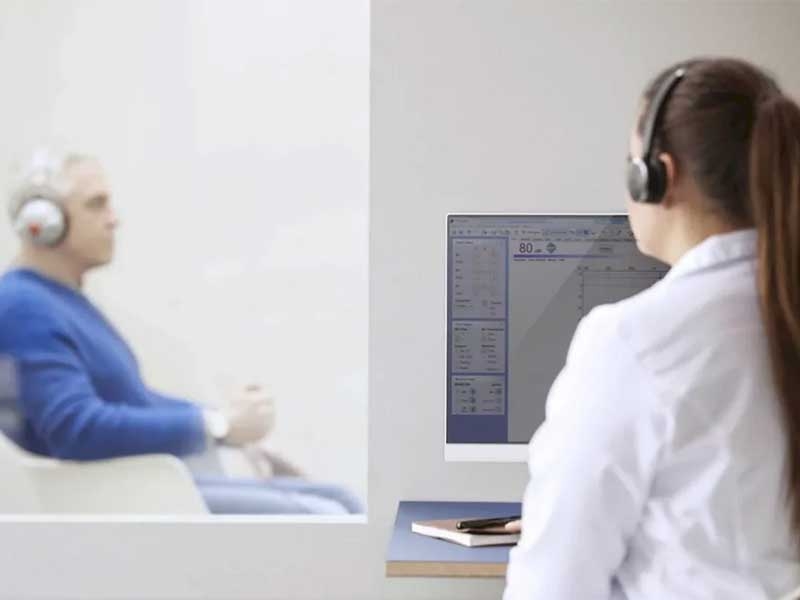
Audiometry
Watch our video about Audiometry
What is Audiometry?
Audiometry is a diagnostic test used to evaluate hearing ability and detect hearing loss or other auditory disorders. It measures a person’s ability to hear sounds at different frequencies and intensities, providing valuable insights into the health of the auditory system.
At Clinic Consultation, we offer state-of-the-art audiometry tests conducted by skilled professionals. This non-invasive and painless procedure is a vital tool for identifying and managing hearing-related issues at any age.
What is Audiometry Used For?
Audiometry is used to assess hearing function and identify abnormalities in how sound is perceived or processed by the ears and brain. It is essential for diagnosing hearing loss, tinnitus, or balance disorders and for evaluating the impact of these conditions on daily life.
This test also plays a critical role in monitoring hearing health in individuals exposed to loud noises, those with a history of ear infections, or patients taking ototoxic medications. At Clinic Consultation, audiometry is part of our comprehensive approach to auditory health.
How Does Audiometry Work?
Audiometry tests involve a series of hearing evaluations conducted in a soundproof room. The patient wears headphones or inserts earphones, and different tones or words are played at varying frequencies and volumes. The patient indicates when they can hear the sounds, allowing the audiologist to create an audiogram—a visual representation of their hearing ability.
Speech audiometry may also be included to assess the ability to understand spoken words at different volumes. The test is painless, typically lasting 20-30 minutes, and results are available immediately. At Clinic Consultation, we ensure a comfortable and thorough examination process.
What Are the Types of Audiometry?
There are various types of audiometry tests designed to evaluate specific aspects of hearing:
Pure Tone Audiometry (PTA)
Measures the softest sounds a person can hear at different pitches. It is the most common type of audiometry used to determine the degree and type of hearing loss.Speech Audiometry
Evaluates the ability to hear and understand speech at different volumes. This test is crucial for assessing real-world communication abilities.Bone Conduction Testing
Uses a bone vibrator placed behind the ear to measure sound transmission through the bones of the skull. It helps differentiate between conductive and sensorineural hearing loss.Tympanometry
Assesses the functioning of the middle ear by measuring how the eardrum responds to changes in air pressure. It is useful for diagnosing fluid buildup or eardrum perforation.Otoacoustic Emissions (OAE) Testing
Measures sound waves produced by the inner ear to evaluate cochlear health, often used in newborn hearing screenings.Auditory Brainstem Response (ABR) Testing
Monitors brainwave activity in response to sound stimuli, useful for diagnosing neurological causes of hearing loss.Free-Field Audiometry
Evaluates hearing in patients unable to wear headphones, such as young children or individuals with physical limitations.
Each test provides unique insights into hearing health, and at Clinic Consultation, we tailor audiometry to meet individual patient needs.
What Conditions Can Be Detected Through Audiometry?
Audiometry is effective in diagnosing a variety of hearing and auditory conditions, including:
Sensorineural Hearing Loss
Identifies damage to the inner ear or auditory nerve.Conductive Hearing Loss
Detects issues in the outer or middle ear, such as blockages or infections.Tinnitus
Evaluates persistent ringing or buzzing in the ears.Otitis Media
Diagnoses middle ear infections or fluid buildup.Otosclerosis
Identifies abnormal bone growth in the middle ear.Presbycusis
Detects age-related hearing loss.Neurological Auditory Disorders
Assesses issues in the brain’s processing of sound, such as auditory neuropathy.
When is Audiometry Indicated?
Audiometry tests are recommended in various situations:
Routine Hearing Screenings
For individuals at risk of hearing loss, such as those over 50 or with a history of loud noise exposure.Tinnitus Symptoms
To evaluate persistent ringing or buzzing in the ears.Difficulty Understanding Speech
Particularly in noisy environments.History of Ear Infections
To assess potential damage or hearing loss caused by recurrent infections.Monitoring Ototoxic Medications
For patients taking drugs known to affect hearing, such as certain antibiotics or chemotherapy agents.Post-Trauma Assessment
Following head injuries or ear trauma.Dizziness or Balance Issues
To rule out vestibular (inner ear) disorders.
Pre- and Post-Audiometry Care
Before the Test:
- Avoid exposure to loud noises for at least 24 hours before the exam.
- Inform the audiologist about any symptoms, medications, or previous ear infections.
After the Test:
- Review the results with your audiologist or doctor to understand any findings.
- Follow recommendations for treatment, hearing aids, or further tests if needed.
What Are the Contraindications for Audiometry?
Audiometry is generally safe and non-invasive, but certain factors may affect its accuracy:
- Earwax Blockage: Can interfere with sound transmission during the test.
- Active Ear Infections: May require treatment before testing.
- Cognitive or Physical Limitations: May affect the ability to participate fully in the test.
At Clinic Consultation, we address these concerns to ensure reliable and effective testing.
What Are the Alternatives to Audiometry?
For patients unable to undergo audiometry, alternative assessments include:
- Tuning Fork Tests: A simple method to differentiate between conductive and sensorineural hearing loss.
- Imaging Tests: Such as MRI or CT scans, to evaluate structural causes of hearing loss.
- Hearing Questionnaires: To assess functional hearing difficulties in everyday life.
Our specialists at Clinic Consultation work closely with patients to determine the most appropriate diagnostic method.
Book Your Audiometry Test at Clinic Consultation
Audiometry is a vital tool for maintaining hearing health and diagnosing auditory conditions. At Clinic Consultation, we combine advanced technology with expert care to deliver accurate results and personalised treatment plans. Schedule your audiometry test online today and take the first step towards better hearing health.
Click here to schedule an appointment online